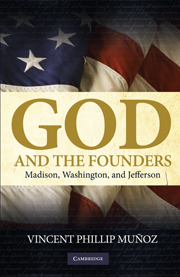Book contents
- Frontmatter
- Contents
- Acknowledgments
- Introduction: The Founders, Religious Freedom, and the First Amendment's Religion Clauses
- PART I THE FOUNDERS' CHURCH-STATE POLITICAL PHILOSOPHIES
- PART II THE FOUNDERS AND FIRST AMENDMENT RELIGION CLAUSES
- Conclusion: The Founders and Church-State Jurisprudence
- Appendix A “Memorial and Remonstrance against Religious Assessments” by James Madison, 1785
- Appendix B A Bill “Establishing a Provision for Teachers of the Christian Religion” by Patrick Henry, 1784
- Appendix C A Bill for Establishing Religious Freedom in Virginia by Thomas Jefferson, 1777
- Index
Conclusion: The Founders and Church-State Jurisprudence
Published online by Cambridge University Press: 05 June 2012
- Frontmatter
- Contents
- Acknowledgments
- Introduction: The Founders, Religious Freedom, and the First Amendment's Religion Clauses
- PART I THE FOUNDERS' CHURCH-STATE POLITICAL PHILOSOPHIES
- PART II THE FOUNDERS AND FIRST AMENDMENT RELIGION CLAUSES
- Conclusion: The Founders and Church-State Jurisprudence
- Appendix A “Memorial and Remonstrance against Religious Assessments” by James Madison, 1785
- Appendix B A Bill “Establishing a Provision for Teachers of the Christian Religion” by Patrick Henry, 1784
- Appendix C A Bill for Establishing Religious Freedom in Virginia by Thomas Jefferson, 1777
- Index
Summary
A sanction is essential to the idea of law, as coercion is to that of Government.
James Madison, Vices of the Political System of the United States (1787)To avoid an arbitrary discretion in the courts, it is indispensable that they should be bound down by strict rules and precedents, which serve to define and point out their duty in every particular case that comes before them. …
Publius, Federalist 78 (1788)In 1878, the Supreme Court turned to Jefferson to adjudicate its first significant Free Exercise Clause case. Nearly seventy years later, in 1947, the Court turned to Jefferson and Madison to resolve its first significant Establishment Clause case. While not always in the foreground of the Court's deliberations, the Founders have been invoked time and time again to guide church-state jurisprudence, including in 2005, when Jefferson, Madison, and Washington were cited in opinions both for and against the constitutionality of state-sponsored postings of the Ten Commandments. The Court, however, has never gotten the Founders right. Most of the justices who have turned to history – and many of the scholars and litigators who have done the research on which those interpretations are based – have assumed that the Founders shared a uniform understanding of the right to religious liberty and that this understanding should be used to adjudicate the First Amendment's religion clauses. But the leading Founders disagreed about the proper separation of church and state. We cannot simply ask, “What would the Founders do?” and then follow their example.
- Type
- Chapter
- Information
- God and the FoundersMadison, Washington, and Jefferson, pp. 206 - 222Publisher: Cambridge University PressPrint publication year: 2009



